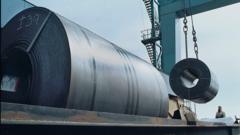The United States has doubled tariffs on steel and aluminium imports from 25% to 50%, a move President Trump claims is aimed at bolstering the American steel industry. Critics warn of economic fallout and retaliation from trade partners as US manufacturers brace for soaring costs and potential order cancellations.
New Tariff Surge: US Steel and Aluminium Import Duties Reach 50%

New Tariff Surge: US Steel and Aluminium Import Duties Reach 50%
President Trump's latest tariffs could trigger significant disruptions in both domestic and international markets, amplifying costs for American manufacturers and affecting trade relations.
In a bold move to protect the American steel industry, President Donald Trump has signed an order that doubles tariffs on steel and aluminium imports from 25% to 50%. This increase, which takes effect on Wednesday, marks a significant escalation of protectionist trade measures initiated during Trump's first term. Trump argues that these tariffs will secure the future of American manufacturing, but the decision has sparked concern among critics about the broader implications for both domestic and international markets.
Businesses that rely on steel and aluminium for their products are wary. Many had hoped the increase was temporary, potentially a negotiating tactic. For instance, Rick Huether, CEO of Independent Can Co. in Maryland, expressed frustration over his halted investments and fears that rising metal prices could push customers toward alternative materials such as plastic or paper packaging. "There's a lot of chaos," he stated.
The U.S. remains the world's largest importer of steel, second only to the European Union. Major suppliers include Canada, Brazil, Mexico, and South Korea. Trump's previous tariffs had already strained international relations, leading to lower steel imports in April, which was down by 17% from March. As the new tariffs loom, Canadian and European Union officials are preparing retaliation efforts, prompting intense negotiations between the U.S. and its partners.
Despite the turbulence, the United Kingdom was granted an exemption from the increases, retaining previous tariffs at 25%. Trade Secretary Jonathan Reynolds emphasized ongoing discussions aimed at fortifying international trade relations. However, UK Steel's director warned that the new 50% U.S. tariffs could be "catastrophic" for UK exports, which constitute around 7% of total UK exports.
Economists forecast considerable repercussions for the U.S. economy, predicting rising prices across affected sectors and potential job losses. A 2020 analysis suggested Trump's original steel tariffs resulted in a net loss of 75,000 jobs across various industries. Chad Bartusek, director at Drill Rod & Tool Steels, described an alarming increase in costs that could lead to fewer orders and reduced hours for his employees. As uncertainty looms over international trade, many in the steel industry hope for resolution to curb further economic damage.





















